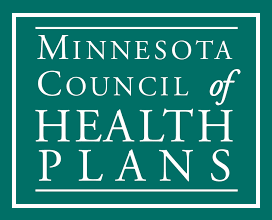Minnesota health plans are dedicated to strengthening Minnesota’s position as the nation’s healthiest state by leading or supporting efforts with community partners, and increasing the value of health care services. One way we demonstrate our efforts is by publicly sharing examples of how we have done this work in the past and what we are doing today.
Background and History of Collaboration Plan
The Collaboration Plan documents how Minnesota Health Maintenance Organizations (HMOs) will contribute to achieving high priority public health goals, per Minnesota Statute 62Q.075.
About the 2020 Collaboration Plan
For this iteration of the plan, we are highlighting collaborative projects that health plans have or are currently working on in the identified public health priority areas. By giving example of these collaborations, we hope to inspire new partnerships with local public health across the state.
To identify the public health priorities, the health plans reviewed the Minnesota Department of Health’s Community Health Assessment, local public health Community Health Assessments, and worked with the Metro Center for Community Health, a collaboration of local public health, hospitals and health plans. Some of these priorities remain the same as the previous Collaboration Plan, such as reducing tobacco use and increasing physical activity. The Collaboration Plan highlights several projects that address these priorities. Since the previous Collaboration Plan, mental health and the social determinants of health have risen to the top for local public health agencies across the state.
The Collaboration Plan provides examples of a few projects in these new priorities. These highlighted projects take different forms and address health through various vehicles. For example, some of the projects may use upstream approaches to address an issue through a health plan’s benefit set while others may initiate programming work in partnership with county or local public health. We know there is room to grow in these areas and look forward to further collaboration on these topics and will expand on this Plan as projects develop over the next five years.
As a note, while we highlight certain services and programs our health plans offer, the Collaboration Plan largely steers clear of listing the array of benefits and services our plans pay for that address public health, well-being, chronic disease, and social determinants of health. However, we know this is important information for our members to access the services that help them become and remain healthy (and for our partners to help support our communities in that effort). Information about benefits offered by each health plan is available on their websites.
The 2020 Collaboration Plan spans five years and runs through 2025. The Collaboration Plan website is updated annually so that all information remains current.
How Equity Plays a Role in Our Work
We know that health inequities in Minnesota exist. They prevent people from living a life of well-being. And they also contribute to higher health care costs. We also know that making sure everyone has what they need to be healthy can’t be solved by any one community, industry, or sector. We can’t make people healthier all on our own. This is why we value our work with others in the community and invest in programs that aim to reduce health disparities.
However, as health plans, we are also addressing inequity in health in four key ways:
- Creating and supporting a diverse workforce within our organizations. This includes increasing training and education to existing staff, recruiting a diverse workforce, and developing a supportive work environment to help maintain a diverse staff.
- Increasing access to culturally and linguistically appropriate care. We do this through programs such as investment in interpreters; providing materials in other languages to our members; and, creating processes to make is easier for all of our members to take advantage of complaint, grievance, and appeals processes.
- Improving quality of care. Work in this area encompasses offering cultural competency training for provider; addressing cultural needs through quality improvement initiatives; and considering race and language when conducting data analysis for program improvement.
- Collaborating to share best practices and move the needle on health disparities. We do this through the Council’s Health Equity Committee, which meets monthly to develop strategies to reduce health disparities and promote health equity through collective action.
Health Plan Data Sources
Health plans provide data to support a number of initiatives across the state. We welcome the opportunity to explore how we can better use data to improve the health of Minnesotans. Some existing data sources we currently support include:
Minnesota Community Measurement (MNCM) provides publicly available information on health care quality, cost, and patient experience.
Healthcare Effectiveness Data and Information Set (HEDIS) measures, developed by the National Committee for Quality Assurance (NCQA), provide data by health plans about the quality of care, access to care, and member satisfaction with health plans and providers.
Minnesota Statewide Quality Reporting and Measurement System (SQRMS) is a standardized set of quality measures for health care providers across the state.
We also compile Medicare, Medicaid, and other available data to help people better understand how conversations in Washington, D.C. and St. Paul, MN impact care at a local county and regional level.
Health Plan Contacts
| Health Plan | Name | |
| Minnesota Council of Health Plans | Chelsea Georgesen | |
| Blue Cross Blue Shield of Minnesota | Pam Teske | |
| Health Partners | Sarah Brown | |
| Hennepin Health | Chelsea Trcka | |
| Medica | Kathy Albrecht | |
| Sanford Health Plan | Dylan Wheeler | |
| UCare | Annie Halland |
Opportunities for Collaboration
Project Collaboration
We understand the value in working together on projects that will improve the health of our communities. Throughout this Collaboration Plan, we identify several current and ongoing projects aimed at improving public health for Minnesotans. In those project descriptions, we list a lead contact to help you connect if you have questions about the work we are doing or if you have identified connecting points with your efforts.
We also want to hear about the work you are doing. Many of our health plans partner with local agencies to support the needs of our members and improve health in the communities we serve. This may include community outreach efforts to better understand the community’s needs, partnering with local agencies to address social determinants of health, or connecting community partners to our care coordination activities. We are at our best when we align our efforts with the good work that is already happening in communities. As local non-profit health plans, we are committed to pursuing local solutions. We’d love to hear more about your community and the work you are doing there! If you have a project you’d like to discuss with us, please get in touch.
Work Groups
In addition to our work with the Center for Community Health (highlighted below) and our engagement with Local Public Health through LPHA, MPHA, and other organizations, staff members from our non-profit health plans actively participate in an extensive list of work groups, task forces, and other key initiatives to improve health and achieve equity in our communities. This participation allows us to learn from our partners, lend our subject matter expertise to important conversations, work collectively to solve problems, and build relationships with health professionals and other stakeholders working to improve health and equity for Minnesotans.
Below is a list of examples of some of the initiatives our health plans and the Minnesota Council of Health Plans participate in to achieve these ends:
- Center for Community Health
- MAARCH
- Maternal Child Health Task Force
- Metro Alliance for Healthy Families
- Minnesota Healthy Partnership
- Minnesota Council of Health Plans Health Equity Committee
If you are participating in a work group or other key initiative and would like to invite one or more health plan to participate, you can do so by reaching out to the Minnesota Council of Health Plans:
Technical Support
Health care is complicated. We rely on our partners for your technical expertise and we make ourselves available to our partners to share our knowledge. In addition to the questions we get from our members about benefits and coverage, we also work with our partners to help you understand information on payment, benefits, and our operational processes. We provide this information on our websites and through our materials, but we know there is also value in having a point of contact to get your questions answered through other venues. For general questions or needs for technical support, we provide below a “front-door” contact for each organization to help connect you to more information in the ‘Health Plan Contacts’ section above.
Volunteer Opportunities
As a collaboration of health plans, we believe in the power of good – of good deeds, good feelings and good people working together. Our team facilitates partnerships within the community by developing and implementing community relations activities for community leadership, employee volunteerism, and corporate contributions. We do this by sharing our expertise and investing in our communities’ well-being. We are committed to working with those who are making good happen all around us. Below is an example of some of the events and causes our organizations have helped provide volunteers for in recent years.
- NAMI Walk
- Habitat for Humanity
- African American Leadership – Baraza Event
- Pimento Relief – Get out the Vote event
- State Fair Healthy Local Foods Exhibit Children’s Area
- Saint Paul Library Bookmobile
- Medical Reserve Corp – community vaccination distribution
- American Heart Association Walk
- Wilder Foundation Homeless Survey Project
If you are putting out calls for volunteers for a community health initiative, we have listed below a point of contact for each of our organizations in the ‘Health Plan Contacts’ section above.
Funding
Our non-profit health plans – often, but not always through the work of our Foundations or through community investment and reinvestment initiatives – contribute to our communities through funding initiatives. In many cases, we seek out partners who are doing good work in areas that align with our goals and strengthen the communities we serve, but we also rely on partners who seek us out for support. In addition to these more formal funding arrangements, there also may be opportunities for semi-formal arrangements when a community or local agency identifies a targeted need.
Below is information to help you better understand how to seek out funding opportunities with our organizations:
Blue Cross Blue Shield of Minnesota
The Blue Cross and Blue Shield of Minnesota Foundation’s (Foundation) invests in efforts addressing the social and economic determinants of health and advancing health equity. The Foundation awards $3-4 million annually to create healthier, more equitable communities. For more information on Foundation programs and grantees, please visit Blue Cross MN Foundation.
HealthPartners
HealthPartners has a corporate contributions budget and makes contributions consistent with our mission as funds are available, though we do not have a giving foundation. Requests for sponsorships and grants are reviewed throughout the year by our sponsorship committee. Sponsorship requests may be made by sending an email to
Medica
The Medica Foundation seeks to improve health by funding initiatives that are innovative in how care is delivered and have a high likelihood of creating long-term change. They are also committee to building partnerships and engaging employees in charitable activities. To read more about grant opportunities, visit www.medicafoundation.org.
UCare
Established in 1998, the UCare Foundation (formerly the UCare Fund) is a community-directed initiative of UCare. We focus our grant-making on programs and initiatives that improve the health of underserved populations in the Twin Cities and throughout Greater Minnesota with innovative services, education, community outreach, and research.
Organizations seeking research or community grants should consider if their mission and activities match the Foundation’s mission and guidelines, and may visit our website or contact the ">UCare Foundation or call 612-676-3595 for more information.
Examples of Public Health and Collaborative Projects
Improving Mental Health
Managing and Preventing Chronic Disease
Collaborative Efforts
Improving Comprehensive Diabetes Care Performance Improvement Project
Public Health Focused Benefit Design
Reducing Obesity and Encouraging Healthier Eating
Collaborative Efforts
Circles of Health & Well-Being Program
Lunch Bags for Mille Lacs County Produce Influencing Communities and Kids (PICK) Bucks Program
Funded Initiatives
Public Health Focused Benefit Design
Increasing Physical Activity
Collaborative Efforts
Funded Initiatives
Public Health Focused Benefit Design
Reducing Tobacco, Drug and Alcohol Use
Collaborative Efforts
Mobile Substance Use Disorder Support (SUDS) Program
Funded Initiatives
Opioid Awareness Toolkit — “Cut Short”
Public Health Focused Benefit Design
Inpatient to Community Care Management for Individuals with Substance Use Disorder
Strengthening Parenting and Family Systems
Collaborative Efforts
Healthy Start Performance Improvement Project
Funded Initiatives
Public Health Focused Benefit Design
Environmental Health
Funded Initiatives
Addressing Social Determinants of Health
Public Health Focused Benefit Design
Homeless Consult Public Health Nurse Program
Inpatient to Community Care Management and Social Service Program
Center for Community Health
As members of the Center for Community Health (CCH), the health plans, hospitals, and local public health agencies in the metro area work on aligning the community health needs assessments (CHNA) as well as identifying and implementing collective actions. These efforts are aimed to address health inequities, leverage resources, and impact health outcomes.
Read more about how health plans support the work of CCH.






